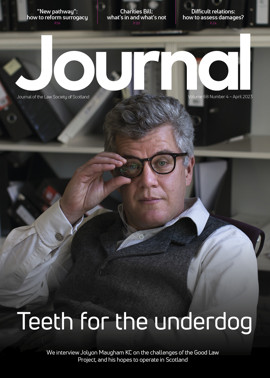Viewpoints: April 2023
Professional witnesses: a reply
The February Journal carried a Viewpoint about professional witnesses and the vital role they play in the administration of justice. That is without question. However, doubt was cast on whether professional witnesses are highly valued and respected. In response it is helpful to highlight the work being done by Scottish Courts & Tribunals Service (“SCTS”), in collaboration with our justice partners, to make it easier for professional witnesses to give evidence.
Since 2020 a cross-sector Remote Professional Witnesses Working Group, chaired by Lord Matthews, has been in place. Part of its work has been to reflect on the innovations and lessons learned from the pandemic and, going forwards, to encourage more evidence to be given remotely.
One such innovation is the introduction, from January 2022, of an agreed default position that professional witnesses in the High Court are to give evidence remotely. Exceptions can be applied for in the usual way. This means that professional witnesses, such as doctors, scientists and police officers, are no longer required to attend court in person.
This enables police officers to give evidence from their police station rather than having to wait in court for their case to be called. It also benefits other professional witnesses who often have to travel significant distances and/or give up a day’s work to attend court. Since January 2022 over 170 professional witnesses, who are not police officers, have given evidence remotely in the High Court.
In Aberdeen Sheriff Court, an initial virtual summary trials pilot focusing on domestic abuse cases has been running since June 2021. In addition to supporting vulnerable witnesses to give their evidence remotely, an essential part and continued focus of the pilot is that it enables evidence from police and medical professionals to be given remotely from different locations across the sheriffdom. This ensures that high quality evidence continues to be provided by such witnesses, while freeing up considerable time to allow them to continue with their essential duties as opposed to travelling to, and waiting in, court with associated costs.
There may be delays and postponements to cases, which are outwith the court’s control. SCTS is acutely aware of the impact any delay has on all those involved, and works with justice partners to minimise these. As part of this work, as reported by the Journal (online news, 5 September 2022), a new initiative to manage summary criminal cases is being piloted in Dundee, Hamilton and Paisley Sheriff Courts. It seeks to reduce the number of unnecessary hearings, which contributed to over 400,000 witness citations last year, through facilitating early disclosure of evidence and early judicial case management.
Should a delay or postponement occur, witnesses will be notified by those who have cited them to attend court.
A further step taken by the cross-sector working group to support more evidence to be given remotely has been its agreement to a witness behaviour protocol. This has been approved by the Faculty of Advocates and COPFS, and is currently being considered by the Law Society of Scotland. The protocol is provided to witnesses who are giving evidence remotely.
The work mentioned above is a mere snapshot of the steps that have been taken to maximise digital innovations and reduce the impact court proceedings can have on professional witnesses. It is an excellent example of collaborative working within the justice system, including with the legal profession.
David Fraser, executive director, Court Operations, Scottish Courts & Tribunals Service
Perspectives
Features
Briefings
- Criminal court: Towards proper control
- Planning: NPF4 – an emerging housing issue
- Insolvency: Court confirms overseas winding up approach
- Tax: R&D relief – welcome changes but outlook uncertain
- Immigration: Family reunions given new rules
- Scottish Solicitors' Discipline Tribunal
- In-house: Support to suit






